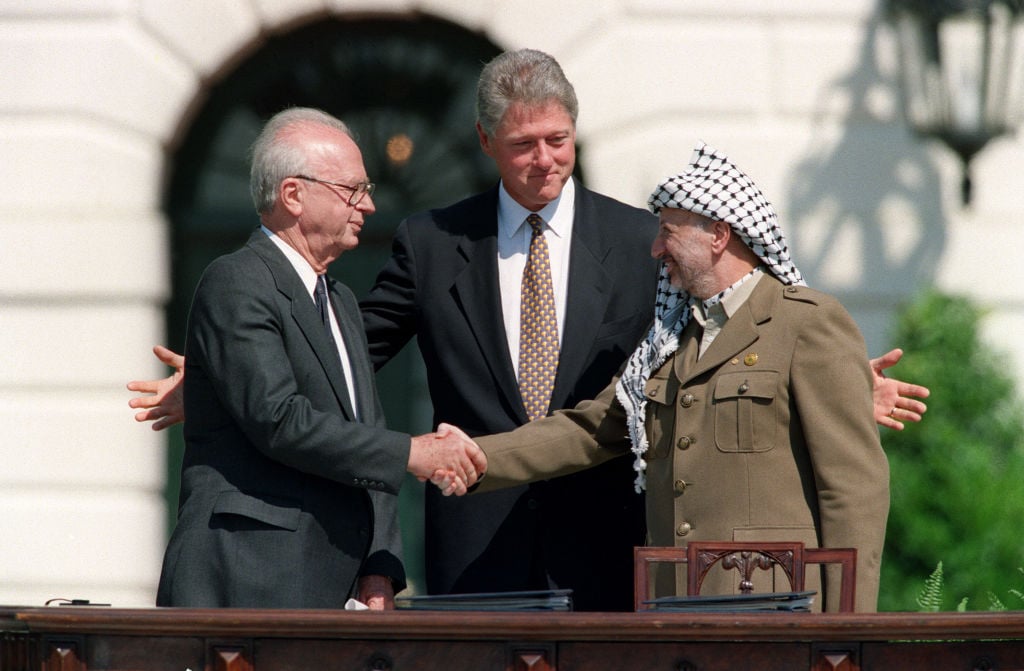Part of the Series
Struggle and Solidarity: Writing Toward Palestinian Liberation
Much of the world celebrated the signing of the Oslo Accords 30 years ago this month, when Palestinian Liberation Organization (PLO) Chair Yasser Arafat and Israeli Prime Minister Yitzhak Rabin engaged in perhaps the most famous diplomatic handshake of the post-Cold War era on the White House lawn.
Peace at last seemed to be at hand, but the dream of Oslo died long ago. There is now an abundance of post mortems on why the Oslo framework failed, but one central misunderstanding typically persists — namely, that it marked the birth of the two-state program, where a state of Palestine would emerge in the occupied territories of the West Bank and Gaza Strip. In fact, Oslo marked the supplanting of a long-preexisting two-state global consensus. To understand why, a brief primer on the contrast between the two-state global consensus and the Oslo framework is necessary.
The two-state global consensus emerged through the enactment of numerous resolutions, approved by lopsided votes, at the United Nations General Assembly and Security Council from late 1967 through 1980. The foundation was set by the council’s unanimous passage in 1967 of resolutions 237 and 242. The former recommended that the Fourth Geneva Convention apply to all areas occupied as a result of the war while the latter emphasized the “inadmissibility of the acquisition of territory by war” and called for both Israel’s withdrawal from the occupied territories and respect for the “sovereignty, territorial integrity, and political independence” of all existing states in the region.
Through the combined efforts of the PLO and the 120-nation Non-Aligned Movement, the UN established two additional norms in the second half of the 1970s: One was declaring an independent Palestinian state on the West Bank and Gaza Strip to be a necessary condition of a peaceful resolution. Two was condemnation of Israel’s settlements as a violation of the Fourth Geneva Convention and a major obstacle to peace. As of 1980, both prongs were endorsed by the PLO and enjoyed overwhelming support within the UN, with the exception of Israel on settlements, and Israel and the United States on Palestinian statehood.
Taking advantage of the weak position of the PLO leadership in the early 1990s, which, following the first intifada, had lost ground to independent resistance actors in the occupied territories, Israel, backed by the U.S., used the Oslo Accords to create a new negotiating framework that turned the two-state global consensus on its head. The accords pointedly omitted any reference to the global consensus or underlying legal norms. Oslo isolated the global community, leaving all issues for U.S.-mediated negotiations between Israel and a vastly weaker Palestinian Authority (PA), who operated under Israeli occupation and served as a security subcontractor obligated to report to Israel on all efforts to investigate and punish Palestinians planning acts of violence against Israeli targets.
Under Oslo, Israel was rehabilitated from being the primary obstacle to peace to the party whose security and political interests commanded preeminent attention. Under the convenient rubric that all issues would be left for negotiations, Israel now enjoyed license to maintain and expand its settlements indefinitely. As Aaron David Miller, a top member of the U.S. diplomatic team, recently recalled, “We weren’t allowed even to use the phrase that ‘settlements were an obstacle to peace.’”
Intent on managing rather than phasing out the occupation, Israel established an extensive network of security checkpoints for Palestinians and bypass roads for Israelis to travel directly from settlements to Israel proper, which disrupted daily life for Palestinians, cut-off Palestinian contiguity, and impeded the PA from developing a coherent and effective system of governance. Combined with disproportionate reprisals and reneging on interim withdrawal agreements, Israel provoked wide despair and discontent among Palestinians by the spring 2000, which helped trigger the second intifada after the failed Camp David talks that summer.
Revealingly, Israel only formally supported some version of a Palestinian state after the onset of the second intifada and the election of hardliner Ariel Sharon as prime minister. But rather than a full withdrawal from the occupied territories and a fully sovereign state of Palestine, the type of deal Israel had in mind was a state in name only, hemmed in by settlement blocs, cordoned-off security areas and an open-ended security apparatus. With U.S. complicity, Israel had stripped the two-state idea of any substantive value.
In the past few years, Israeli politics have moved so far to the chauvinist right that the current government rules out any concessions to the Palestinians. With the surging influence of ultranationalist political parties and the appointment of a national security minister who openly proclaims that the rights of Jews trump those of Arabs, Jewish supremacy prevails throughout greater Israel. Hence, Israel now rejects even the rump versions of a Palestinian state floated by U.S. negotiators over the past two decades.
The one consolation of Israel’s grim political trajectory is that it’s no longer possible to cling to the illusion that the negotiating framework established by Oslo can be resurrected. All can see that the creature is dead and buried. Whether it’s possible to reinvigorate the preexisting two-state global consensus — which continues to be affirmed by the UN and regional bodies — remains to be seen. It may be time to resurrect and modify very different visions of coexistence, such as a single democratic, egalitarian state or a federated binational program that both accommodates distinct collective identities and fosters shared governance and interactions across Israel-Palestine.
What is undeniable is the need for a completely transformed diplomatic approach to ending Israel’s subjugation of Palestinians, one that is not overseen by the U.S. and subject to the vast power disparities between Israelis and Palestinians. The first step is mourning not the death of Oslo, but its birth 30 years ago.
